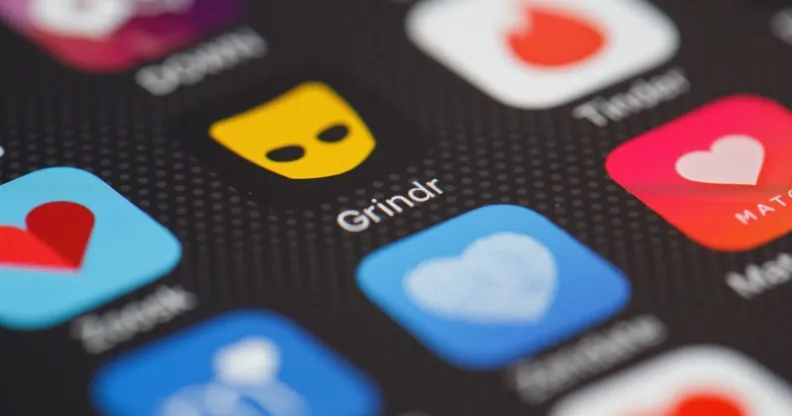Grindr users using ‘secret codes, symbols and emojis’ to sell illegal drugs on app

Grindr is being used to sell drugs (Leon Neal/Getty Images)
Grindr, the world’s largest gay dating app, is being increasingly used for the sale of illicit drugs through secret codes that use emojis and symbols, according to a new report.
Speaking to men who had been involved in selling or buying illegal substances on the app, NBC News uncovered a world of secret languages, codes and even innocent-looking emojis used to conceal the activity.
One dealer, identified only as Mike, said he used Grindr as it gave him “more clientele” than he “would normally get on the street” and that using the app was safer as he didn’t have to worry about bumping into other dealers.
Another app user, Travis Scott, said he frequently received messages from people asking if he was “into PNP.”
PNP is an acronym for “Party and Play” – a term used to describe engaging in sexual activity while under the influence of illegal drugs.
It is also referred to as chemsex, a trend in which people take drugs that enhance sex and make them feel uninhibited, usually involves crystal methamphetamine, mephedrone, cocaine, ketamine or other amphetamines.
Be alert to these secret Grindr drug codes and emojis
To conceal the selling or buying of drugs, some people use code words, symbols and emojis.
The diamond emoji is used to refer to crystal meth and the snowflake symbol is used to attract the attention of people wanting to buy cocaine.
Some Grindr users feature the capital letter T in their profiles, which refers to the street name for meth, Tina.
Phil McCabe, a social worker and president of the National Association of LGBT Addiction Professionals, told NBC he believed the situation had escalated in recent years.
He said he had been messaged by someone offering “parTy favours” and said apps were “making it easier for people” to buy drugs.
Chemsex has been linked to an increased risk of HIV and STIs because the use of drugs and alcohol in sexual settings may encourage unprotected sex.
Grindr has been at the centre of other controversies before
Earlier this year, it emerged that Grindr was sharing the HIV statuses, sexual preferences and other personal details of users with outside software vendors.
A BuzzFeed investigation found the app had shared data with two external companies, including their GPS position, sexuality, relationship status, phone ID and ethnicity.
Grindr’s Vice President of Social Impact Jack Harrison-Quintana apologised for the “distress” caused to users.
“I want to start by apologising from everyone here at the Grindr team for all of the distress that we’ve caused over the last 48 hours,” he said in a video.
“I know that many of you have questions about what happens to the information you put on your Grindr profile, and I’m going to try and answer some of those questions today.
“I want to say at the outset very clearly that we have never and would never sell any user data, especially HIV information, to advertisers, or anyone else.”

